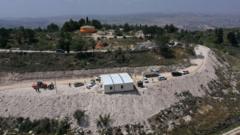Israeli ministers have revealed the approval of 22 new Jewish settlements in the occupied West Bank, representing the largest expansion initiative in decades. Defence Minister Israel Katz and Finance Minister Bezalel Smotrich confirmed that several settlements previously constructed without official authorization will now receive legal status under Israeli law. Settlements have long been a focal point in the Israeli-Palestinian conflict, as they are viewed as illegal under international law, despite Israel’s contention to the contrary.
Katz emphasized that this development serves as a preventive measure against the establishment of a Palestinian state, which he claims would threaten Israel’s security. In contrast, the Palestinian presidency condemned the move as a "dangerous escalation," indicating the deepening tensions it has provoked.
The Israeli anti-settlement organization Peace Now criticized the expansion, stating that it would significantly alter the landscape of the West Bank and further entrench the occupation, which has lasting implications for the future of both Israelis and Palestinians. Since the 1967 Middle East war, when Israel occupied the West Bank and East Jerusalem, around 160 settlements housing approximately 700,000 Jews have been established in these areas — land that Palestinians seek for a future state.



















